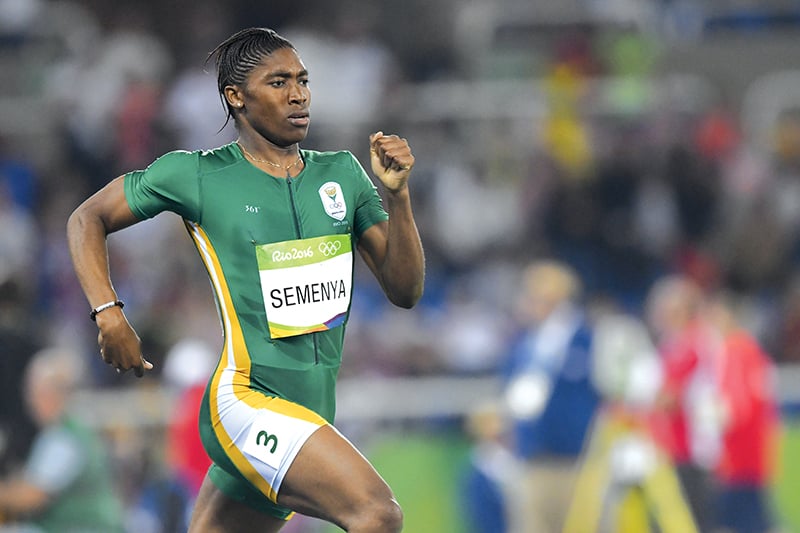Davies Ward Phillips & Vineberg LLP is, without doubt, an iconic Canadian business law firm, a mainstay of tradition and a proud bearer of corporate Canada’s colours when the need for legal expertise arises.
Which makes it highly unlikely that anyone would intuitively expect Caster Semenya, the South African runner who has for years been embroiled in a high-profile dispute over nothing less than her testosterone levels with the International Association of Athletics Federations, to be on DWPV’s client roster.
But she is. And, as evidenced by her ubiquity on the news and sports pages of the world’s leading periodicals following the International Court of Arbitration for Sport’s ruling on April 30th requiring her to reduce her testosterone levels if she wished to continue competing as a woman in the 800 and 1500 metres events she has dominated internationally, her presence on that roster may make her the firm’s most famous client.
Now, if you look on the firm’s website, and more particularly at the bios of partner James Bunting and associate Carlos Sayao in Davies’ Toronto office, Sports Law won’t exactly leap out at you. But dig a little deeper (hit the “See More” link on their webpages) and what you’ll discover is that among Bunting’s primary credits is “a landmark case before the International Court of Arbitration for Sport”. As for Sayao, the details are all about his previous career as an athlete and his experience at the COA.
Then it starts to make sense. Indeed, the “landmark case” on Bunting’s bio refers to Indian sprinter Dutee Chand, 19 years old when Bunting, Sayao (then an articling student) and Davies’ “Jurist in Residence”, former Supreme Court of Canada Justice Morris Fish of Montreal, represented her pro bono before the Court of Arbitration in 2014.
“As a general litigation counsel, one of the areas I had cultivated was a niche practice in sports litigation,” Bunting says. “So when Bruce Kidd [the Canadian long-distance runner and former Olympian] asked me to help out, we decided to take on the case.”
The case arose, according to Bunting, because some of Chand’s competitors in India “complained that she runs like a boy.”
“Dutee came from a very impoverished area in India and all she had was running,” Bunting says. “Then suddenly she’s being subjected to a panoply of tests including the hyperandrogenism one, which she failed. Someone leaked it to the media, which ran headlines questioning whether she was a boy or girl.”
Ultimately, however, Chand prevailed. Her DWPV legal team won a stunning victory when the COA declared that IAAF regulations banning Chand because of her high testosterone levels were discriminatory, and that banning her from competing was not a “necessary and proportionate means of preserving fairness in athletics competition and/or policing the binary male/female classification.”
As the Chand panel saw it, there was insufficient evidence that high testosterone levels gave individuals a significant enough advantage to validate the IAAF’s hyperandrogenism regulations. But the COA did give the IAAF the opportunity to provide further evidence to validate the regulations.
Instead, in March 2018, the IAAF informed the CAS that it intended to withdraw the existing regulations and replace them with new ones.
“The new rules applied only to distances between 400 and 1500 metres, and they only applied to international competitions,” Bunting says. “So that closed the case against Dutee, who ran the 100 and 200 and competed in the Rio Olympics.”
But it didn’t close the case against Semenya. The new rules, known as the DSD regulations, required her and other females with naturally-occurring testosterone levels above a prescribed limit to reduce that level and maintain it for six months to maintain their eligibility.
Semenya and Athletics South Africa challenged the regulation. Greg Nott of Johannesburg, now head of Norton Rose Fulbright’s Africa team, had represented Semenya since she was a young track star.
“With my youngest son, Thomas, I was watching the 800 metre competition in the 2009 world championships held in Berlin, and we were screaming our heads off for Caster,” Nott recalls. “But before we knew it, she was stripped of her title and suspended.”
The very next day, Nott decided to reach out to the South African Minister of Sport and offer his services.
“At the time, I was the managing partner of the South African office of a global law firm with global reach,” he says. “We had a dynamic Sports Law department and I thought, ‘How can I sit by idly watching our young athlete being bullied?’ especially when I had at my disposal the tools to meet fire with fire.”
The scenario struck a chord with Nott partly because he had spent a long time in the country’s anti-apartheid movement.
“The actions against Caster smacked of behaviour I had seen more than once in the eighties,” he says.
Nott and his colleagues successfully negotiated Semenya’s return to competition, where she eventually became a world champion and an Olympic athlete.
Through all this, the bond between lawyer and athlete only grew stronger.
“I changed firms and Caster followed me, becoming a family friend as well as a client — very much a part of me,” Nott said. “Over the years, with the help of my colleagues Sandra Sithole and Patrick Bracher, and with the full support of Norton Rose, we’ve built a strong team around her.”
When the IAAF formulated the DSD regulations, Semenya consulted Dr. Payoshni Mitra, an Indian scholar, athletes’ rights advocate, and research consultant and lecturer at the University of London who had championed Chand. Payoshni knew Bunting through her involvement with Chand and suggested to Nott that he engage the Canadian.
“I reached out to Jim,” says Nott, who was a solicitor as opposed to a barrister in South Africa’s bifurcated Bar. “We felt a kinship after our first call and it produced a working relationship and friendship that exceeded any expectations.”
As it had to, because the case was even more complicated than Chand’s.
“Both cases engaged ethics, morality, science and law in a way that we’ll never see again,” Bunting says. “But while Chand’s case had 16 witnesses, 12 of whom were experts, there were 32 expert witnesses involved in Caster’s arbitration, in fields that included gynecology, endocrinology, genetics, psychiatry, sports medicine and physiology.”
Surprisingly, the hearing lasted only one week, largely because of the COA’s unique process.
“The parties create panels in the different areas of expertise, they meet and go over the issues in advance, and then they all go into the box,” Bunting explains. “Each expert provides his or her view on the individual issues, with the panel and counsel free to ask questions,” Bunting explains. “It feels a bit like a free-for-all, but it does get a lot of evidence out quickly and can be very effective.”
Apart from the advocacy, however, it’s obvious that these types of cases make a profound personal impression on counsel.
“Quite apart from the profoundly global scope and impact of what’s at stake, you’re dealing with an individual client whom you get to know well and whom you are trying to protect because these rules have already had a profound impact on their lives — and you want to make sure that they can continue doing the one thing they can do,” Bunting says. “We’re advocating for people to run the way they’re born and at the simplest level, we celebrate genetic variation.”
Sayao, a competitive swimmer on Canada’s national team for seven years who trained with Michael Phelps at the University of Michigan, understood Chand and Semenya’s trials from personal experience.
“I’m openly gay and struggled in the world of athletics, so it was lovely to be involved in a case that engaged the fundamental rights of a single individual whose life had been impacted in such a direct, significant way,” he said.
Unfortunately, the IAAF made hay of its second crack at the evidentiary can. Although the Semenya panel unanimously concluded that the DSD regulations were discriminatory, a 2-1 majority concluded that the regulations were necessary, reasonable and proportionate to obviate the “significant performance advantage” that Semenya and similar athletes had over other female athletes. But the panel members unanimously expressed “serious concerns about aspects of the practical application of the DSD Regulations when they are implemented”. More particularly, they were concerned about athletes who, through no fault of their own, might not be able consistently maintain the mandated testosterone levels.
In character, Semenya — who won her final race before the new rules took effect — made it clear that she had no intention of complying. And in solidarity, the ASA didn’t take long to announce that it intended to appeal to the Swiss Federal Tribunal.
For his part, Sayao sees reason for optimism going forward.
“It wasn’t as clean a win for the IAAF as some would have expected,” he says. “Quite apart form the fact that one arbitrator agreed with us, you don’t often read decisions where strong concerns are expressed by panel members about the difficulty of implementing their award.”
The appeal court will also have to deal with the widespread global support for Semenya.
“The United Nations Human Rights Council and three UN special rapporteurs filed an amicus brief supporting Semenya before the CAS,” Nott says.
Above all, there’s little doubt that Semenya will stay the course.
“Caster is indomitable, she is strong and she takes everything she does in her stride, including the decision,” Nott says. “Our team will continue to coordinate our attack against the regulations until we prevail."
Which makes it highly unlikely that anyone would intuitively expect Caster Semenya, the South African runner who has for years been embroiled in a high-profile dispute over nothing less than her testosterone levels with the International Association of Athletics Federations, to be on DWPV’s client roster.
But she is. And, as evidenced by her ubiquity on the news and sports pages of the world’s leading periodicals following the International Court of Arbitration for Sport’s ruling on April 30th requiring her to reduce her testosterone levels if she wished to continue competing as a woman in the 800 and 1500 metres events she has dominated internationally, her presence on that roster may make her the firm’s most famous client.
Now, if you look on the firm’s website, and more particularly at the bios of partner James Bunting and associate Carlos Sayao in Davies’ Toronto office, Sports Law won’t exactly leap out at you. But dig a little deeper (hit the “See More” link on their webpages) and what you’ll discover is that among Bunting’s primary credits is “a landmark case before the International Court of Arbitration for Sport”. As for Sayao, the details are all about his previous career as an athlete and his experience at the COA.
Then it starts to make sense. Indeed, the “landmark case” on Bunting’s bio refers to Indian sprinter Dutee Chand, 19 years old when Bunting, Sayao (then an articling student) and Davies’ “Jurist in Residence”, former Supreme Court of Canada Justice Morris Fish of Montreal, represented her pro bono before the Court of Arbitration in 2014.
“As a general litigation counsel, one of the areas I had cultivated was a niche practice in sports litigation,” Bunting says. “So when Bruce Kidd [the Canadian long-distance runner and former Olympian] asked me to help out, we decided to take on the case.”
The case arose, according to Bunting, because some of Chand’s competitors in India “complained that she runs like a boy.”
“Dutee came from a very impoverished area in India and all she had was running,” Bunting says. “Then suddenly she’s being subjected to a panoply of tests including the hyperandrogenism one, which she failed. Someone leaked it to the media, which ran headlines questioning whether she was a boy or girl.”
Ultimately, however, Chand prevailed. Her DWPV legal team won a stunning victory when the COA declared that IAAF regulations banning Chand because of her high testosterone levels were discriminatory, and that banning her from competing was not a “necessary and proportionate means of preserving fairness in athletics competition and/or policing the binary male/female classification.”
As the Chand panel saw it, there was insufficient evidence that high testosterone levels gave individuals a significant enough advantage to validate the IAAF’s hyperandrogenism regulations. But the COA did give the IAAF the opportunity to provide further evidence to validate the regulations.
Instead, in March 2018, the IAAF informed the CAS that it intended to withdraw the existing regulations and replace them with new ones.
“The new rules applied only to distances between 400 and 1500 metres, and they only applied to international competitions,” Bunting says. “So that closed the case against Dutee, who ran the 100 and 200 and competed in the Rio Olympics.”
But it didn’t close the case against Semenya. The new rules, known as the DSD regulations, required her and other females with naturally-occurring testosterone levels above a prescribed limit to reduce that level and maintain it for six months to maintain their eligibility.
Semenya and Athletics South Africa challenged the regulation. Greg Nott of Johannesburg, now head of Norton Rose Fulbright’s Africa team, had represented Semenya since she was a young track star.
“With my youngest son, Thomas, I was watching the 800 metre competition in the 2009 world championships held in Berlin, and we were screaming our heads off for Caster,” Nott recalls. “But before we knew it, she was stripped of her title and suspended.”
The very next day, Nott decided to reach out to the South African Minister of Sport and offer his services.
“At the time, I was the managing partner of the South African office of a global law firm with global reach,” he says. “We had a dynamic Sports Law department and I thought, ‘How can I sit by idly watching our young athlete being bullied?’ especially when I had at my disposal the tools to meet fire with fire.”
The scenario struck a chord with Nott partly because he had spent a long time in the country’s anti-apartheid movement.
“The actions against Caster smacked of behaviour I had seen more than once in the eighties,” he says.
Nott and his colleagues successfully negotiated Semenya’s return to competition, where she eventually became a world champion and an Olympic athlete.
Through all this, the bond between lawyer and athlete only grew stronger.
“I changed firms and Caster followed me, becoming a family friend as well as a client — very much a part of me,” Nott said. “Over the years, with the help of my colleagues Sandra Sithole and Patrick Bracher, and with the full support of Norton Rose, we’ve built a strong team around her.”
When the IAAF formulated the DSD regulations, Semenya consulted Dr. Payoshni Mitra, an Indian scholar, athletes’ rights advocate, and research consultant and lecturer at the University of London who had championed Chand. Payoshni knew Bunting through her involvement with Chand and suggested to Nott that he engage the Canadian.
“I reached out to Jim,” says Nott, who was a solicitor as opposed to a barrister in South Africa’s bifurcated Bar. “We felt a kinship after our first call and it produced a working relationship and friendship that exceeded any expectations.”
As it had to, because the case was even more complicated than Chand’s.
“Both cases engaged ethics, morality, science and law in a way that we’ll never see again,” Bunting says. “But while Chand’s case had 16 witnesses, 12 of whom were experts, there were 32 expert witnesses involved in Caster’s arbitration, in fields that included gynecology, endocrinology, genetics, psychiatry, sports medicine and physiology.”
Surprisingly, the hearing lasted only one week, largely because of the COA’s unique process.
“The parties create panels in the different areas of expertise, they meet and go over the issues in advance, and then they all go into the box,” Bunting explains. “Each expert provides his or her view on the individual issues, with the panel and counsel free to ask questions,” Bunting explains. “It feels a bit like a free-for-all, but it does get a lot of evidence out quickly and can be very effective.”
Apart from the advocacy, however, it’s obvious that these types of cases make a profound personal impression on counsel.
“Quite apart from the profoundly global scope and impact of what’s at stake, you’re dealing with an individual client whom you get to know well and whom you are trying to protect because these rules have already had a profound impact on their lives — and you want to make sure that they can continue doing the one thing they can do,” Bunting says. “We’re advocating for people to run the way they’re born and at the simplest level, we celebrate genetic variation.”
Sayao, a competitive swimmer on Canada’s national team for seven years who trained with Michael Phelps at the University of Michigan, understood Chand and Semenya’s trials from personal experience.
“I’m openly gay and struggled in the world of athletics, so it was lovely to be involved in a case that engaged the fundamental rights of a single individual whose life had been impacted in such a direct, significant way,” he said.
Unfortunately, the IAAF made hay of its second crack at the evidentiary can. Although the Semenya panel unanimously concluded that the DSD regulations were discriminatory, a 2-1 majority concluded that the regulations were necessary, reasonable and proportionate to obviate the “significant performance advantage” that Semenya and similar athletes had over other female athletes. But the panel members unanimously expressed “serious concerns about aspects of the practical application of the DSD Regulations when they are implemented”. More particularly, they were concerned about athletes who, through no fault of their own, might not be able consistently maintain the mandated testosterone levels.
In character, Semenya — who won her final race before the new rules took effect — made it clear that she had no intention of complying. And in solidarity, the ASA didn’t take long to announce that it intended to appeal to the Swiss Federal Tribunal.
For his part, Sayao sees reason for optimism going forward.
“It wasn’t as clean a win for the IAAF as some would have expected,” he says. “Quite apart form the fact that one arbitrator agreed with us, you don’t often read decisions where strong concerns are expressed by panel members about the difficulty of implementing their award.”
The appeal court will also have to deal with the widespread global support for Semenya.
“The United Nations Human Rights Council and three UN special rapporteurs filed an amicus brief supporting Semenya before the CAS,” Nott says.
Above all, there’s little doubt that Semenya will stay the course.
“Caster is indomitable, she is strong and she takes everything she does in her stride, including the decision,” Nott says. “Our team will continue to coordinate our attack against the regulations until we prevail."
Lawyer(s)
Firm(s)
Davies Ward Phillips & Vineberg LLP
Norton Rose Fulbright LLP





